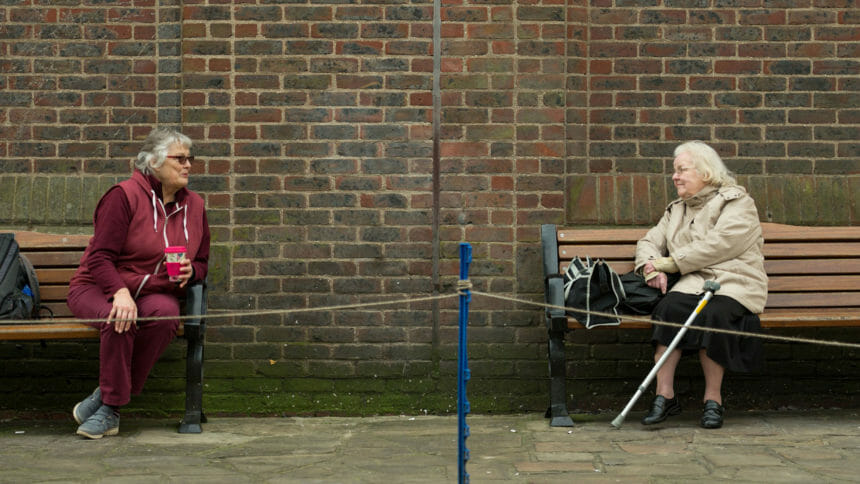
The American Health Care Association / National Center for Assisted Living has released guidance on innovative methods that senior living and care communities can use to keep residents and family members connected while maintaining a mindset on infection prevention and control.
Until there is a vaccine or new treatments for COVID-19, the virus will remain a “considerable threat” to long-term and post-acute care, challenging providers to adapt to a “new normal” to keep residents engaged physically, emotionally and socially, according to the organizations.
“As communities at-large adapt to changing circumstances, it is time to use additional, innovative methods to reconnect residents with the things they love to do and the people they love to see,” AHCA / NCAL wrote. “Providers can use an infection control and prevention mindset to help come up with innovative methods of keeping residents connected.”
That mindset, the groups said, includes maintaining many of the practices put in place at the start of the COVID-19 pandemic, including screening all employees and visitors for signs and symptoms of illness, exercising frequent hand washing, using face masks, practicing social distancing, and cleaning and disinfecting frequently touched surfaces.
AHCA / NCAL offered a variety of suggestions for connecting residents both indoors and outdoors. For outdoor spaces, the organizations suggest using outdoor courtyards, parking lots and grassy areas.
For indoor spaces, they suggest developing “see-through rooms” using glass or plastic to allow for full visitation while ensuring separation, reconfiguring foyer entry areas and common areas, and setting up a resident / patient room for visitations.
The organizations encourage long-term care facilities to begin developing plans to invite residents out of the rooms by implementing basic infection prevention and control practices. This can include facilitating social distancing during movement in hallways, using face masks, creating physical and visual social distancing markers in common areas, and allowing a limited number of people in common areas.
With an eye toward social distancing and the use of face masks, AHCA / NCAL suggest that facilities begin resuming activities such as book clubs; knitting, sewing, cross stitching and needlepoint clubs; exercise classes; movie nights; ice cream socials; tea, coffee or happy hours; and outdoor activities such as gardening and mini-golf.
“The possibilities for innovative and creative ideas to engage residents are virtually endless,” AHCA / NCAL stated, encouraging facilities to consult local and state guidance when developing new approaches. “Remember to engage residents, their representatives and their loved ones in brainstorming on ways that are meaningful to each resident.”
AHCA / NCAL has posted stories on its website of how providers are keeping residents engaged.
In other coronavirus-related news:
- Pennsylvania state Rep. Josh Kail (R-Beaver/Washington) has introduced legislation that would require all employees and residents in long-term care facilities to be tested for COVID-19. House Bill 2543 goes beyond Gov. Tom Wolf’s voluntary compliance recommendation, which does not include assisted living communities or personal care homes.
- North Dakota Gov. Doug Gurgum has unveiled plans to restart visitations in a phased approach for assisted living communities and basic care and skilled nursing facilities across the state. The plan is being studied by a task force led by a resident at Luther Memorial Home in Mayville, ND, with the goal of having it ready by June 25.
- As Florida reopens, the cumulative overall number of deaths attributed to COVID-19 doubled in May, while coronavirus deaths at assisted living communities and nursing homes tripled. Slightly more than half of the reported coronavirus deaths of Floridians now are linked to long-term care facilities, according to the state.
- UnitedHealthcare Community Plan donated 10,000 masks to the Florida Assisted Living Association — the latest single donation of masks — and Stanley Healthcare donated 1,000 masks. The cloth, washable masks will be distributed to staff working in assisted living and family care homes across the state.
- Texas Health and Human Services is urging assisted living communities, nursing facilities, hospices, intermediate care facilities and group homes to update their emergency preparedness plans ahead of a busy hurricane season forecasted by the National Oceanic and Atmospheric Administration. The state signed up 200 hotels to give counties options for vulnerable populations, including older adults, individuals with underlying conditions or those with diagnoses of coronavirus.
- The Iowa Department of Public Health is under scrutiny for not notifying the public of a coronavirus outbreak at a nursing home for nearly three weeks. Five residents of Ramsey Village Continuing Care’s assisted living memory care facility, four residents of its nursing home wings, and three employees tested positive for the virus.
- Florida’s Agency for Health Care Administration has shuttered South Florida Home Services for “a failure to protect residents from the coronavirus” after it allowed a COVID-19-positive staffer to care for residents with no protective gear other than a surgical mask.
- The Pasadena, CA, prosecutor’s office is considering filing criminal charges against Jasmin Terrace at El Molino, an assisted living community specializing in memory care, alleging that the community required an employee to work after he tested positive for COVID-19 and was showing symptoms.
- Lantern of Chagrin Valley assisted living and memory care community in South Russell, OH, has created a “hug booth” to allow families to embrace safely.
- Safety is going to rank equally with amenities in the post-COVID world for those looking to move into a senior living community, according to one article.
- Arizona doesn’t have to publicly reveal the number of coronavirus cases and deaths among residents of long-term facilities, retirement homes and nursing homes, a state judge ruled. News organizations had sued the state health department to gain access to the information.
- The U.S. Department of Housing and Urban Development has issued guidance for the use of electronic signatures, files and documents in HUD-assisted seniors housing. LeadingAge President and CEO Katie Smith Sloan called the announcement a “key flexibility needed to keep residents both housed and healthy.”




